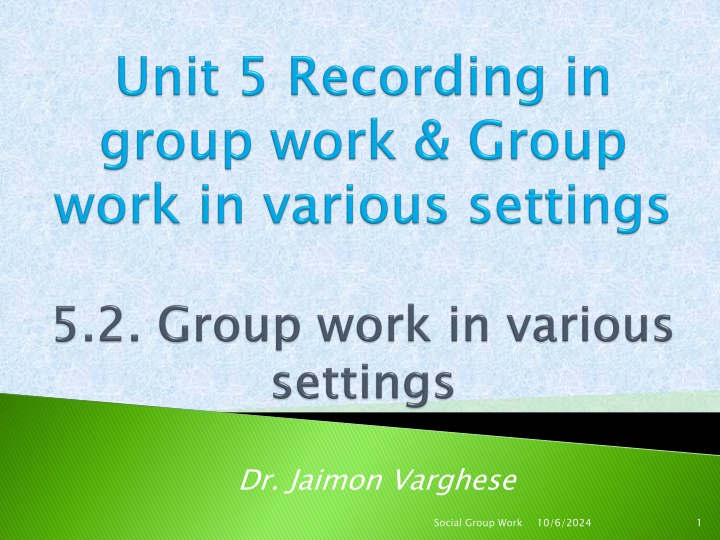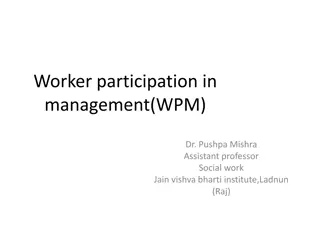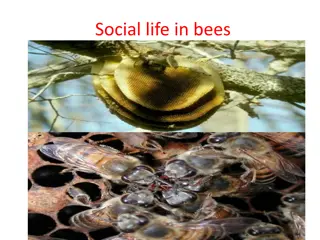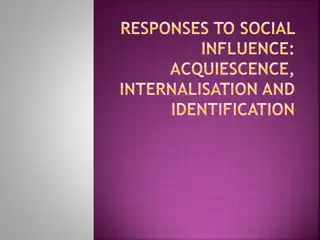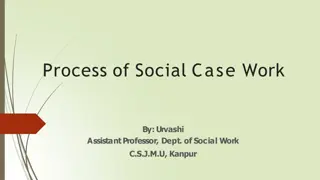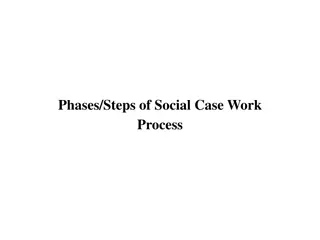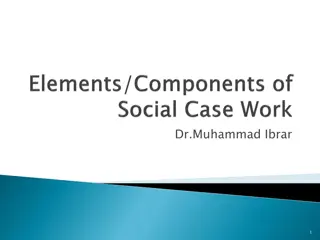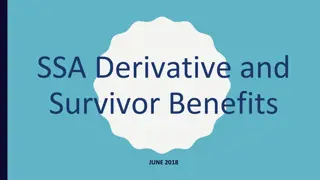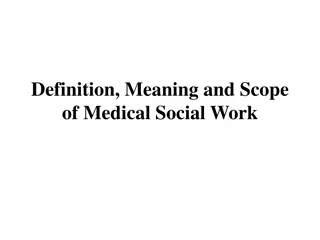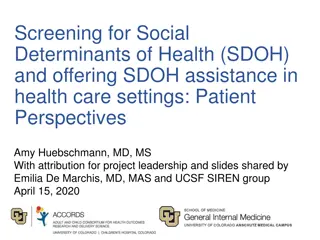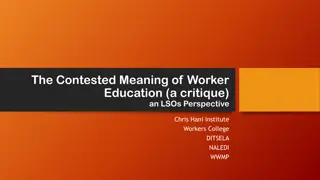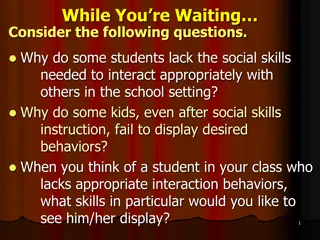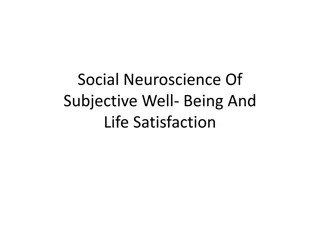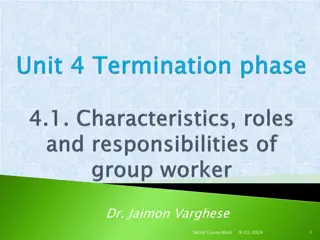Role of Social Group Worker in Various Settings
Social group workers play a crucial role in diverse settings such as hospitals, clinics, and institutions, working with individuals facing challenges in health, child development, women development, family welfare, and industrial communities. They facilitate group work to enhance socialization, emotional growth, and community integration. These workers support patients in clinical settings, help marginalized children in institutional care, and promote social belongingness and mutual acceptance.
Download Presentation

Please find below an Image/Link to download the presentation.
The content on the website is provided AS IS for your information and personal use only. It may not be sold, licensed, or shared on other websites without obtaining consent from the author.If you encounter any issues during the download, it is possible that the publisher has removed the file from their server.
You are allowed to download the files provided on this website for personal or commercial use, subject to the condition that they are used lawfully. All files are the property of their respective owners.
The content on the website is provided AS IS for your information and personal use only. It may not be sold, licensed, or shared on other websites without obtaining consent from the author.
E N D
Presentation Transcript
Dr. Jaimon Varghese Social Group Work 1 10/6/2024
Health, Child development, Women development, Family welfare, Industrial communities Urban Rural Tribal
In the hospitals and clinics, the social group worker becomes a member of a team composed of the medical doctor, psychiatrist, psychologist, therapist, nurse, and social caseworker.
In clinical settings with a defined treatment goal, the purpose of the service becomes much more specific than in the community setting. Social workers in medical setting extend direct services by using group work and casework methods. In the medical setting the social worker carry out group work and performs various roles
i) enable patients with similar problems to come together and so feel less isolated and alone in facing their problems; ii) bring about a feeling of belongingness and bring a part of a community which would give them the courage and confidence to adjust to the larger community outside; iii) work through problems in an atmosphere of mutual acceptance; iv) use the group as a therapeutic agent for emotional growth and attitudinal change through the process of mutual sharing
Both the government and voluntary organisations offer institutional services for children and youth like observation homes, orphanages, homes for the street children, etc. Most important part of institutional care lies in daily group living situation which can be used constructively for the purpose of socialisation and teaching the life oriented skills to the children.
The group worker deals mostly with the homeless children and adolescents to whom the group situation is crucial in life outside of the institution. In the absence of family these children need all the services given to children in their own homes and some additional ones related to their anxieties, loneliness, and planning for life outside The quality of group living is therefore as vital as the educational, clinical and other specialized services attached to the institution. The functions of the social group worker on the institutional team are twofold: to help with the group living situation and to conduct special groups.
i) direct group work with formed groups of children inside the institution. ii) work with parent groups, where possible. iii) being responsible and helping with the recreational programme as part of group living iv) supervision and coordination of child care takers (sometimes called house parents). v) supervision of volunteers who work with groups of children placed in the institution
vi) responsibility for referral to resources for group association in the community, when the child is in the institution as well as when planning for his release. vii) responsible participation in diagnosis of individuals and in decisions regarding placement in the institution, grouping of children, treatment plans, and plans for after-care. viii) the social group workers sometimes conduct discussion or activity groups with a therapeutic purpose with children who have strong negative feelings or difficulties in relating to adults
The school setting is definitely a group setting, and teachers work with groups The school social worker works with four parties: the child, the family, the school staff and the community
Social group worker promotes group adjustment through group work activities. He organizes group work activities in the form of recreation, roleplays, story telling, group exercises, etc. to increase the capacity of social participation and constructive group interaction in the school children. Through guided group interaction the worker promote relatedness, belongingness and the feeling of identification among children which helps in the improvement of their social adjustment & the development of their personality
Working with special student groups, the school social worker expand practice with specially formed groups of children and teen- agers experiencing difficulties in social and academic adjustment. He gives special attention to students who underachieve, disrupt, drop out, or are withdrawn from meaningful peer involvement. He ensures that lonely, isolated, and handicapped children have an opportunity for constructive participation in special interest or recreational groups
Conduct value education classes and leadership development programmes. Through the group work activities he orient the children about cooperation, teamwork, role taking, etc. The school social worker uses the group work method while assisting or leading special interest groups in activities such as dramatics, puppet-making, other hobbies, or community service projects. Motivate students to participate in varied activities that broaden horizons and expand relationships with peers and adults
Institutional settings Short stay home Shelter homes Working women s hostels Community settings SHG Women in distress Family courts Counselling centres
Programmes to meet their psychosocial needs, empowerment needs, economic needs & develop relationship skills Programmes to develop their life skills, educational, vocational, occupational, and career skills Self-help and self reliance
Group work with children, adolescents, youth, the aged, the differently abled, women in distress, families in dispute, single parents, other genders etc. both in agency & community settings
Programmes to meet their psychosocial needs & develop relationship skills Programmes to develop their life skills, educational, vocational, occupational, and career skills
Purposes of group work with the aged: i) to raise the self-esteem of the participants ii) to give an opportunity for planning. iii) to become a part of their own small community and a part of a larger community. iv) to establish a group bond to replace the warmth of family relationships. Purposes of group work with the aged:
The functions of the social group worker in community based agencies: i) working out a program for different kinds of groups as per the needs with this age group. ii) direct work with certain groups of the aged, especially those who present problems in relationships. iii) as in all group work, some contact with individuals outside of the group, but more intensively in the particular age group. iv) training, coordination and supervision of volunteers or part time workers in programs for the aged. v) consultant to committees of older citizens in relation to social action in their own behalf, if requested to do so The functions of the social group worker in community based agencies:
The functions of the social group worker in the institution for the aged: i) direct work with formed groups for the purpose of specific help to those who cannot easily enter the group life of the institution; ii) responsibility for the stimulation of a rich and varied programme in the institution designed to allow for satisfaction of individual needs and to counteract the feeling of segregation from the community which may appear in an institution. This is usually done by either being a consultant to the staff of one or several institutions The functions of the social group worker in the institution for the aged:
Working with the employees Working with the management Development of soft skills, interpersonal skills, leadership skills, assertiveness skills, communication skills Emotional wellbeing
Treatment groups (socio emotional needs) Task groups (committees, delegations, training groups) Cultural and recreational needs Improvement of technical and managerial skills Educational and career development Group living skills, interpersonal relationships and interactions
Dealing with issues like personality problems, addictions, indiscipline, truancy, irregularity, lack of motivation Cooperation with coworkers and supervisors
Urban Rural Tribal
Social integration of the community on a local neighbourhood basis through participation in self-help and mutual-aid programmes; motivating people to improve their living conditions especially those adversely affecting their physical and social development
creation of opportunities for undertaking programmes of economic betterment based on the maximum use of community resources and local initiative; identification and development of local leaders with emphasis on providing them organisational skills and enabling them to locate and fully utilize various technical, social and welfare services; and development of a sense of belonging to the community
self-help groups, recreational groups, action groups
Organizing the various sections of a community into well-knit groups. organises the group members to develop their personality through participation in recreational, cultural and other activities. development of responsible leadership from the groups
Operating on a macro level, one of the major tasks is to work at an inter-group level which includes the ensuring that intergroup rivalries are kept at the minimal level, fostering of inter-group cooperation, matching the objectives of each group and the objectives of the community as a whole, facilitating communication, etc.
Another crucial role for the group worker is that of a resource person which requires her to be aware of various avenues within and outside the community, which could be utilized for enhancing the functioning of the group members.
Become a vital link between the civic administration and the people ( liaison functionary ) play the role of a management expert to impart skills to the group leaders and other members in the area of office management with special emphasis on skills in letter writing, filing procedures, basic accounting, writing records of meetings, and elementary public relations and fund raising
IGNOU (2020) MSW 008 - Social Group Work: Working with Groups (rev. ed.). New Delhi: School of Social Work, Indira Gandhi National Open University Social Group Work 32 10/6/2024
Social Group Work 33 10/6/2024
